Philippines Stake Is Improving the Health of Children through Ministering
Contributed By Aubrey Eyre, Church News staff writer
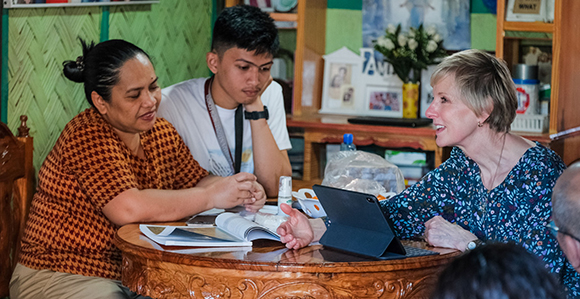
A family in the Philippines talks with Relief Society General President Jean B. Bingham in their home in Catarman, Philippines, on February 3, 2020.
Article Highlights
- Ministering visits from sisters specifically assigned to help with a nutrition pilot program report children have experienced an improvement in overall health.
Related Links
CATARMAN, Philippines
Stooping down over a small mound of dirt, Franco Batiles smiled as he pointed to a small green sprout emerging from the mound.
A year ago, Batiles had proudly donated the earnings from some 2,000 kilograms of watermelons grown on that same ground to help his entire ward in the Catarman Philippines Stake attend the temple in Cebu.
But that was before the flooding from Typhoon Tisoy—known internationally as Typhoon Kammuri—swept through the area in December 2019 and destroyed most of the crops on his family’s small farm.
Now, amid rice fields and rolling hills of coconut tree forests, a few small sprouts are beginning to emerge from some of the carefully cultivated mounds of dirt sprawling across the garden. Batiles is working hard to regrow what was lost for his wife, three children, and father. These tiny, fragile sprouts signal a hope for better days ahead, and Batiles takes special care to pray over them often.
For the Batiles family and others in the rural province of Northern Samar, a garden supplements one’s livelihood. But the Batileses’ garden is also an essential part of their children’s physical and spiritual well-being.
When asked what he will do to recover from the typhoon-caused losses, Batiles grinned and said, “Buy more seeds and get back to work.”
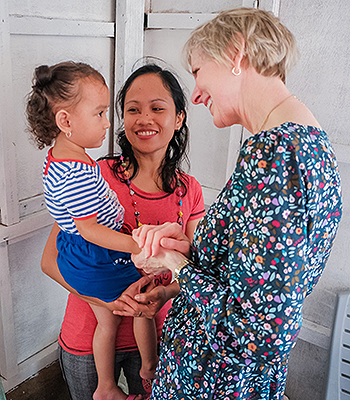
Relief Society General President Jean B. Bingham visits with the Batiles family in their home in Catarman, Philippines, on February 3, 2020, to learn about their experience participating in a new stake pilot program focused on malnutrition.
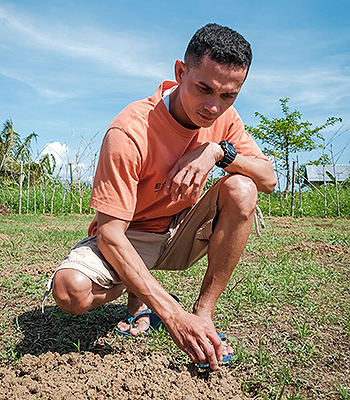
Franco Batiles crouches over a mound of dirt in his garden in Catarman, Philippines, on February 3, 2020, to show visitors the new sprouts popping up after his garden was destroyed by Typhoon Tisoy in December 2019.
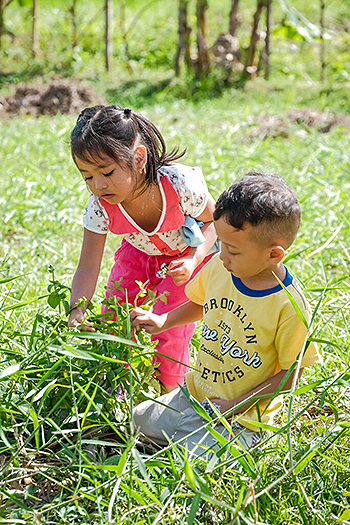
Children in the Batiles family play in the garden next to their house during a visit from President Jean B. Bingham to their home in Catarman, Philippines, on February 3, 2020.
According to UNICEF, approximately 95 children in the Philippines die each day from malnutrition. Additionally, nearly a third of Filipino children experience stunted growth as a result of an insufficient diet. Without a proper balance of nutrition, both a child’s body and brain can suffer long-term negative consequences, like poor cognitive function and stunting.
That children in agriculturally productive and plentiful Philippines could regularly be considered malnourished seems inconceivable. But as President Jean B. Bingham, said after visiting the area on February 3, malnutrition is not limited to a singular group.
“It can strike anywhere,” said the Relief Society General President, who interacted with several families participating in the Philippines Area’s pilot program addressing malnutrition. Even children whose parents are educated and have sufficient income can experience malnutrition, she noted.
Before the Catarman stake began its nutrition program a little over a year ago, Franco and Cherelyn Batiles said they weren’t even aware that malnutrition should be a worry, and they certainly didn’t think any of their children would be in critical need of nutritional attention. However, over the course of many months of ministering visits from sisters specifically assigned to help them with the new program, their children have experienced an improvement in overall health and are getting much closer to the ideal weights and heights for their ages.
Addressing Malnutrition
Following a First Presidency directive to respond to the ongoing malnutrition concerns globally, the Philippines Area Presidency in early 2019 called on stakes in their area to develop their own grassroots approaches to stem malnutrition, said Elder Evan A. Schmutz, General Authority Seventy and Philippines Area President. Heeding that call, members of the Catarman stake “rolled up their sleeves and got to work,” he said.
At the heart of the Catarman program is ministering—something very familiar to Church members. Basing their approach to malnutrition on the one-by-one philosophy of ministering, the Catarman stake—under the priesthood direction of stake president Amando E. Estonanto Jr.—formed nutrition committees, first at the stake level and later at the ward level. Two members—Jeremiah Pedrola, a member of the stake who works as a nurse, and Peter Dilema, the stake historian and a dedicated record keeper—helped organize the stake nutrition committee.
Utilizing the skills of members with medical backgrounds or knowledge of the education programs used by the local government and schools to address malnutrition problems, the committee developed a system to train ward members as nutrition specialists. Each specialist was then tasked with helping to assign ministering brothers and sisters to families and train them in how to weigh, measure, and assess the nutritional status of children as well as to continually track the children’s progress. The committee became a vehicle for combining people and resources already available in the area to better implement and distribute knowledge and best practices regarding nutrition.
Additionally, ministering sisters and Relief Society members took it upon themselves to train one another on how to prepare simple and nutritious meals, something to be utilized by all the ward members. The stake nutrition committee also sought help from local government units to provide guidance and training for the program, while Latter-day Saint Charities provided standard weighing scales and other equipment to measure the weight and height of children, both at initial screenings and throughout the program.
When the program’s first screenings took place in March 2019, 86 children were enrolled. As successes became apparent, more families enrolled; now more than 100 children are participating, with more than 50 percent having shown improved overall nutrition, Dilema said.
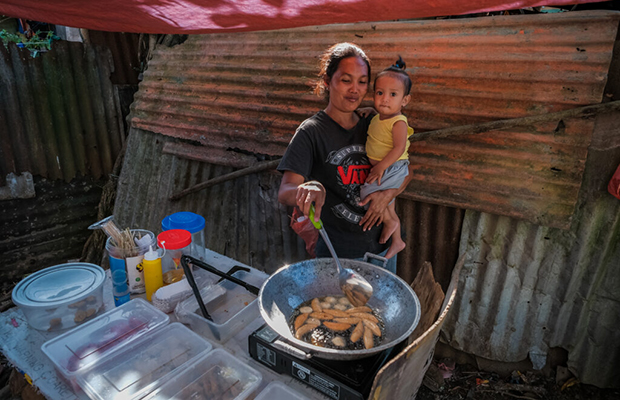
A mother cooks food outside her home in Catarman, Philippines, on February 3, 2020, during a visit from President Jean B. Bingham.
The Power of Ministering
Clarissa Velez, the Batiles family’s ministering sister, sees her main task as caring for both the spiritual and temporal well-being of those to whom she ministers. For her, ministering isn’t merely helping these children overcome malnutrition but rather loving them and supporting them in this and whatever else they may need.
Velez visits each of her four assigned families at least weekly to monitor how the families are doing with the program, taking each child’s measurements monthly to track progress and report back to the ward and stake record keepers. Additionally, Velez assists the families in keeping daily food journals for their children, which show the variety of foods the children are now eating and track the consistent intake of any supplements used to help improve their overall nutrition.
“I’ve learned how to best help them by the power of the Holy Ghost,” Velez said, getting a bit emotional. For many of the ministering brothers and sisters, the program has helped them better understand the power of ministering one by one.
“It is a matter of love; it’s the time I spend with them,” said Olivia Dilema, one of the ministering sisters in the program and the wife of the stake historian, Peter Dilema.
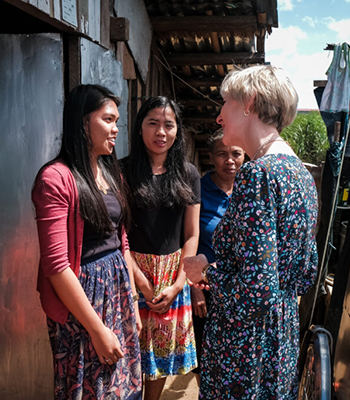
Relief Society General President Jean B. Bingham speaks with Charlene Lagrimas, left, and Maribel Chu, outside the home of a family they minister to as part of a stake pilot program focused on malnutrition in Catarman, Philippines, on February 3, 2020.
In addition to spearheading many of the ministering efforts for the program, the stake and ward Relief Societies are teaching one another how to cook more nutritious meals and properly sanitize food and kitchen environments.
While the program addresses a temporal need, the only way it really works is by addressing spiritual needs as well, said Sister Robin Gunnell, a welfare missionary supporting the stake’s efforts.
President Bingham underscores that the program isn’t something sent from Church headquarters with a singular expected outcome. “The leaders sat down and counseled together,” she said. “They received revelation. They acted on revelation. They learned from what they had done, and they created a marvelous program that was really beneficial to the members here. That sense of partnership, loving your brothers and sisters, was just marvelous.”
Women in the Philippines are amazing in how they move the Church forward, said Elder Schmutz on the success of the program and the leadership of the Catarman stake’s Relief Society members.
President Bingham added that she noticed how the Relief Society’s drive to work “hand in glove” with local priesthood leadership was making an impact on the program’s success. “The Relief Society leaders provided some strength and background that really made this effort move forward,” she said. “I love how the sisters took initiative. They didn’t hang back, but they went forward and helped.”
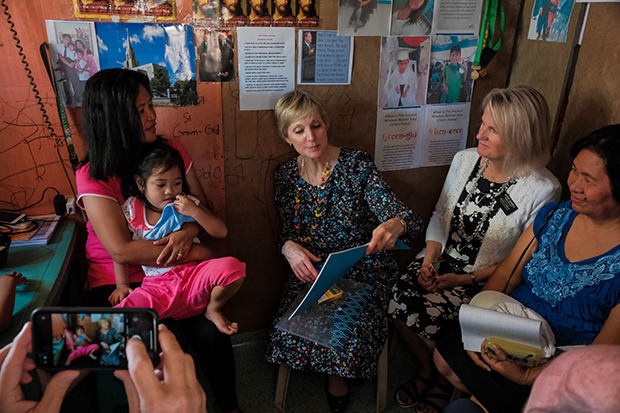
Relief Society General President Jean B. Bingham visits a home in Catarman, Philippines, Monday, February 3, 2020, to learn how a Church-sponsored pilot nutrition program is working.
Charlene Lagrimas, a young single adult in the stake who ministers to several families, described how understanding the situations of those she is serving and really getting to know them makes a big difference in knowing how to serve them.
In some cases, the consistent visits and care of ministering brothers and sisters to families in need have helped to reactivate some less-active Church members—one of the many blessings having come from the program, explained President Estonato of the Catarman stake.
President Bingham said it is an example of how ministering works. “One of the things I appreciate with the ministering sisters is they were so dedicated to loving those children and their mothers. They would visit them often, and they would help them with whatever questions they had and would provide the support and encouragement they needed to make a difference in their children’s lives.”
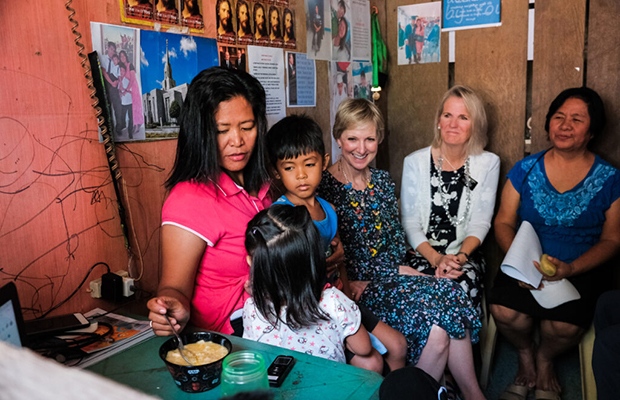
Relief Society General President Jean B. Bingham, center, visits the Donor family at their home in Catarman, Philippines, on February 3, 2020. President Bingham visited the area to learn of a new stake pilot program focused on malnutrition.
Counseling to Make a Difference
Another key to the program’s success has been ward councils working to address various families’ specific needs in a confidential manner, Dilema explained. By counseling together about cases where children showed no signs of improvement or other challenges arose, leaders were able to work together to identify alternative helpful measures.
As ward nutrition specialists and ministering sisters encounter children who need additional care, they are able to seek advice and help from the ward or stake nutrition councils for further resources or assistance in addressing children with special nutritional needs or restrictions.
Even when only one child in a family is identified as malnourished, all children are measured and tracked for food intake, something that Peter Dilema believes has made the program more easily accepted by families. As such, no one is singled out, and any guilt or embarrassment on behalf of the parents, all of whom are doing their best to care for their children, is removed, he explained.
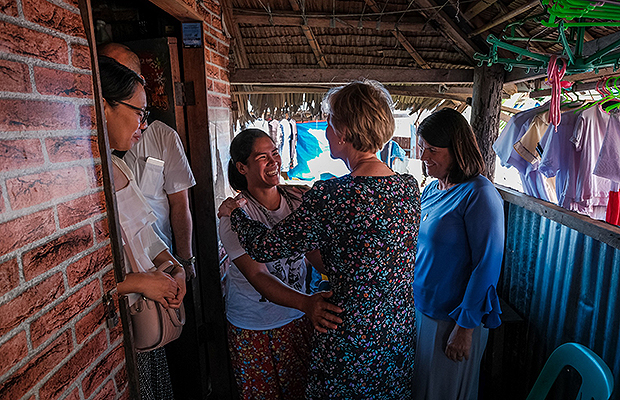
Relief Society General President Jean B. Bingham visits with Micheelle Artigas at her home in Catarman, Philippines, on February 3, 2020. President Bingham visited the area to learn of a stake pilot project focused on malnutrition.
Speaking in a February 3 meeting to the ward and stake leaders participating in the program, Elder Steven R. Bangerter of the Area Presidency expressed appreciation to the leaders for counseling together. “You’ve made it about the people you’re serving, and that starts in the council setting,” he said, calling it an echo of how the prophets seek to serve members of the Church worldwide.
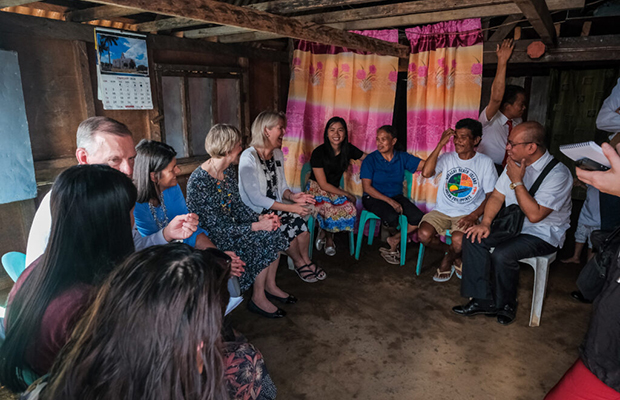
Relief Society General President Jean B. Bingham, center, visits the Sarmiento family at their home in Catarman, Philippines, on February 3, 2020. President Bingham visited the area to learn of a new stake pilot program focused on malnutrition.
The nutrition pilot program has shown great success thus far, and it won’t stop just in the Philippines, Elder Bangerter said. As the Church’s Welfare and Self-Reliance Services Department seeks to learn more about the program and its successes, the hope is it can be replicated and used elsewhere within the Church.
Elder Schmutz said seeing many children move out of the risk zone has been encouraging.
Speaking of the families she met who are participating in the program, President Bingham said, “When they were first told that their children weren’t getting the appropriate nourishment, it must have been a shock. And yet they thought, ‘I’m going to do everything I can to help my child.’ They made every effort to keep track of what they’re eating and to provide them appropriate nutrition.”
In many ways, the Batiles family is an example of the area’s dedication by many parents to improve the lives of their children. Resilience, faith, and hope are among the beautiful and almost inherent qualities of the Filipino people. With every challenge that comes their way—whether from natural disasters, economic circumstances, health problems, or whatever else they encounter—Filipino Latter-day Saints continually demonstrate a willingness to work together to weather the storms of life.
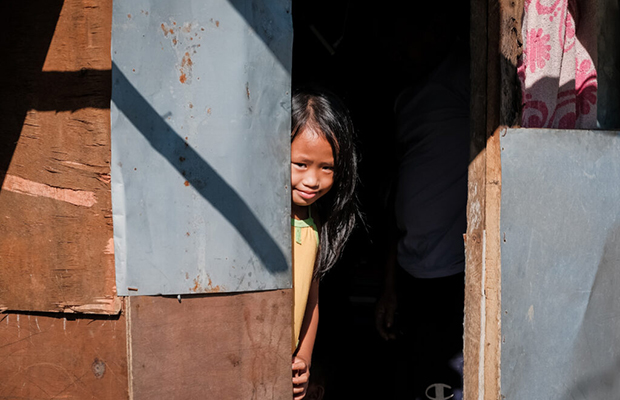
A young girl pokes her head out of her front door in Catarman, Philippines, on February 3, 2020. President Jean B. Bingham visited families in the area to learn about a stake pilot program focused on addressing malnutrition in the area.
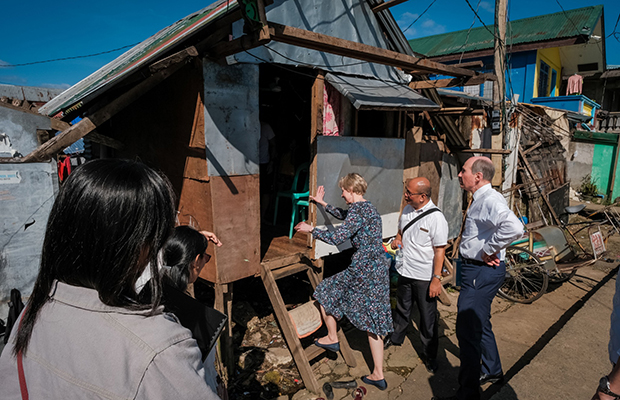
President Jean B. Bingham, Relief Society General President, and her husband, Bruce, stop by a home in Catarman, Philippines, on February 3, 2020.
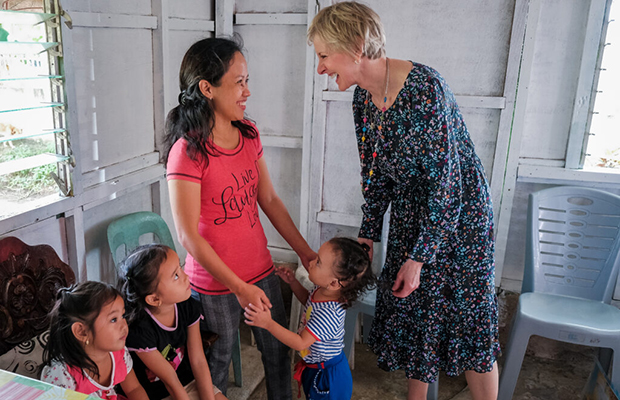
President Bingham visits with the Batiles family in their home in Catarman, Philippines, on February 3, 2020, to learn about their experience participating in a new stake pilot program focused on malnutrition.
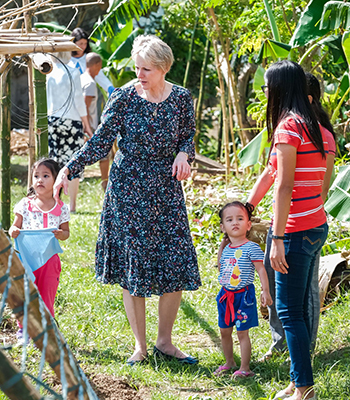
Relief Society General President Jean B. Bingham walks through the Batiles family’s garden during a visit to Catarman, Philippines, on February 3, 2020.
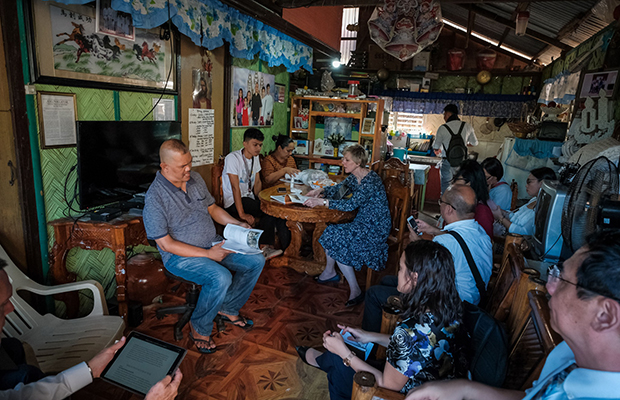
Relief Society General President Jean B. Bingham meets with Latter-day Saints during a visit to Catarman, Philippines, Monday, February 3, 2020. She came to learn how a Church-sponsored pilot program focused on nutrition is working.
